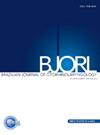Cochlear implantation and cognitive function in the older adult population: current state of the art and future perspectives
IF 1.7
4区 医学
Q2 OTORHINOLARYNGOLOGY
引用次数: 0
Abstract
Objectives
Hearing loss is associated with increased cognitive decline and incident dementia in older adults. Given the rapidly rising incidence of dementia, management of modifiable risk factors such as hearing loss, is essential to mitigate the impact on the individual and society in general. In this narrative review, we discuss the current state-of-art with respect to studying cognitive function before and after cochlear implantation in the elderly population. Future perspectives are considered to shed light into the pathophysiology of cognitive decline due to hearing loss and how objective measures may contribute to this field.
Methods
The existing literature on cochlear implantation and cognition is reviewed. The potential limitations and objective measures for cognitive functioning are discussed. Relevant studies were identified through a broad search of academic databases, including Pubmed and Web of Science. Given the narrative nature of this review, no strict inclusion or exclusion criteria were applied, allowing for a broad overview of the current state-of-the-art literature on the effects of cochlear implantation on cognitive functioning, the challenges of studying cognition in this population and future research directions.
Results
Multiple studies have been able to demonstrate an improvement of cognitive functioning in older adults with severe-to-profound hearing loss after cochlear implantation. However, it is important to consider the challenges of studying cognition in this population. Evoked response potentials might have potential as an objective marker for cognition in this study population.
Conclusion
Although there is no standardized study protocol to investigate cognition after cochlear implantation, a significant improvement in cognition is observed in the majority of studies one year after cochlear implantation. The identification of an objective marker of cognitive functioning will help unravel how cochlear implantation affects cognition.
求助全文
约1分钟内获得全文
求助全文
来源期刊

Brazilian Journal of Otorhinolaryngology
OTORHINOLARYNGOLOGY-
CiteScore
3.00
自引率
0.00%
发文量
205
审稿时长
4-8 weeks
期刊介绍:
Brazilian Journal of Otorhinolaryngology publishes original contributions in otolaryngology and the associated areas (cranio-maxillo-facial surgery and phoniatrics). The aim of this journal is the national and international divulgation of the scientific production interesting to the otolaryngology, as well as the discussion, in editorials, of subjects of scientific, academic and professional relevance.
The Brazilian Journal of Otorhinolaryngology is born from the Revista Brasileira de Otorrinolaringologia, of which it is the English version, created and indexed by MEDLINE in 2005. It is the official scientific publication of the Brazilian Association of Otolaryngology and Cervicofacial Surgery. Its abbreviated title is Braz J Otorhinolaryngol., which should be used in bibliographies, footnotes and bibliographical references and strips.
 求助内容:
求助内容: 应助结果提醒方式:
应助结果提醒方式:


